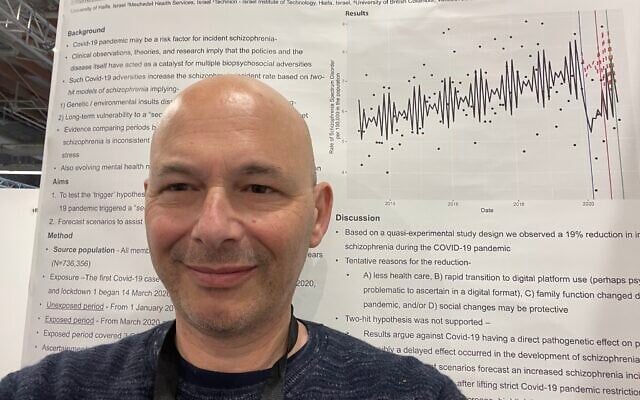A researcher at the University of Haifa says he has found that people diagnosed with Type 2 diabetes face a 50 percent higher risk of developing late-onset schizophrenia compared to people without diabetes. For women, the risk may be even higher.
“Type 2 diabetes is already known to raise the risks of multiple health conditions, including heart disease and dementia,” said lead researcher Prof. Stephen Levine of Haifa’s School of Public Health, who recently spoke to The Times of Israel in a teleconference call. “Our findings show it also increases the risk of schizophrenia in middle and old age.”
The researcher said the findings could allow early identification of high-risk individuals and lead to new protocols that include psychiatric monitoring and support as an integral part of diabetic patient care.
The study followed more than 99,000 Israelis aged 51 to 71, all members of Meuhedet Health Services and without a prior history of Type 2 diabetes or schizophrenia, from January 2005 to February 2020.
It found that those with Type 2 diabetes were 50% more likely to develop schizophrenia than those who did not have the blood sugar disorder. Among women, the figure rose to 64%, while men were 39% more likely, Levine said.
The research was conducted in collaboration with Prof. Arad Kodesh from Haifa’s Department of Community Mental Health and Meuhedet Health Services and Prof. Abraham Reichenberg from the Department of Psychiatry at Mount Sinai Hospital in New York.

It was published last month in the peer-reviewed Oxford University Press journal Schizophrenia Bulletin.
“The research might help prevent considerable suffering for patients and their families,” Levine said.
Why diabetes might cause schizophrenia
Levine said there are several reasons why Type 2 diabetes, also known as adult-onset diabetes, and late-onset schizophrenia sometimes occur together.
First, the association might be due to the same genes in both conditions. One diabetes-related gene, TCF7L2, which helps control insulin release and blood-sugar regulation, has also been linked to higher schizophrenia risk.
Studies find that people experiencing their first episode of psychosis often have unusual blood-sugar readings.
People with diabetes often find it difficult to maintain healthy habits. Poor diet, lack of exercise, and poor sleep can worsen overall health, possibly making schizophrenia more likely. Some research suggests that the way the body reacts to stress could increase the risk for both Type 2 diabetes and schizophrenia.
Prof. Mark Weiser, who has served as the chairman of the psychiatric division at Sheba Medical Center since 2006 and does research in schizophrenia, epidemiological studies and clinical trials, told The Times of Israel that the medications given to patients with schizophrenia are often associated with a risk of diabetes.
“So, when a schizophrenia patient gets diabetes, we say it’s because of the medication,” Weiser said. “But these findings show something that’s exactly the opposite, which is very intriguing.”

Siblings of people with schizophrenia are more likely to develop Type 2 diabetes, and family histories of diabetes and schizophrenia tend to appear together, hinting at shared family risk factors.
In women, lower estrogen levels after midlife may also play a role in triggering schizophrenia at older ages.
Levine said that medical teams who follow people with diabetes could give a brief psychological screening test.
Investigating an unusual comorbidity
Levine, who for the past 20 years has studied schizophrenia, including the risks of schizophrenia in Holocaust survivors, said that there is considerable scientific evidence showing that people with schizophrenia are at risk of diabetes.
Certain antipsychotic medications used to treat schizophrenia can lead to changes in an individual’s metabolism, which could increase the risk of developing Type 2 diabetes.
Levine said that he thought, “There’s no reason for the association not to be the other way around.”

“Nobody had ever researched that before,” said Levine, who was born in Scotland and moved to Israel in 1988. “I wanted to turn the research on its head.”
Type 2 diabetes, which is often associated with obesity and a lack of exercise, is one of the most common chronic diseases in the world.
Characterized by high blood sugar levels and associated with damage to blood vessels, the heart, and the nervous system, the disease could cause blindness, kidney dysfunction and lead to limb amputation.
Scientists have linked rising rates of Type 2 diabetes worldwide to sharp growth in numbers of overweight individuals, as well as declines in physical activity and increased life expectancies.
In Israel, diabetes rates have risen slightly from 6.6% of the population in 2012 to 7.4% in 2023, the last year for which Health Ministry data is publicly available.

Globally, nearly 600 million people suffered from diabetes as of 2024, a number expected to surpass 850 million by 2050, with the highest prevalence expected in the Middle East and North Africa, according to the International Diabetes Federation.
“The most worrying thing is that diabetes is clearly on an increase worldwide,” Levine said. “There are major contributing factors to the disease which are preventable, many of which are lifestyle factors, including diet and physical activity.”
Schizophrenia is a severe mental disorder that affects about 1% of the population around the world, including in Israel. Onset usually starts when people are in their early 20s.
“People with the disorder have hallucinations, they have delusions, confusion, and cognitive disorder,” Levine said.
He explained that after the disorder’s onset, it “[persists across] one’s lifespan, incurring functional impairments, occupational impairments, as well as social and family stigma and challenges.”
It is rare for people to develop schizophrenia in middle age, Levine said. There were approximately 1.2 cases of adult onset schizophrenia per 100,000 people per year among those without diabetes during the time of his study. However, among people with Type 2 diabetes, there were about 2.6 cases of adult onset schizophrenia per 100,000 people per year.
“[Since] we know that people with diabetes suffer from more depression,” Levine said, “there’s no harm in doctors adding a couple of questions to probe patients’ psychotic experiences to be aware of a potential issue.”
“Identifying psychosis early in adults with diabetes could reduce patient suffering,” he said. “At the same time, it could help relieve some of the burden of caregivers.”

